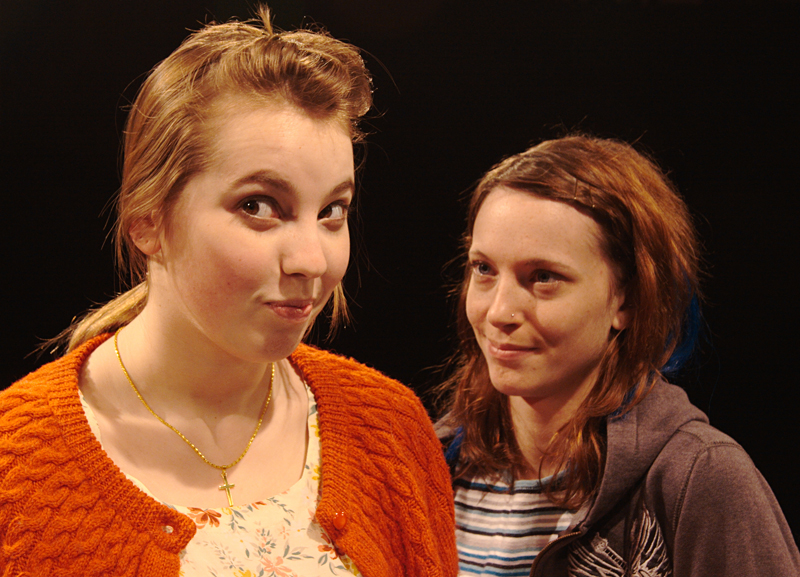Given the horrors of adolescence, it’s a puzzlement that so many playwrights keep asking us to return to that cruel, tenderhearted, melodramatic time of life. Zits, first kisses, and the senior prom hardly seem the stuff of Shakespeare or Sophocles, yet in Catherine Trieschmann’s 2004 London and off-Broadway crowd-pleaser, the small world of a slightly deformed girl, her mother, and her new best friend feels mythically large, despite playing out on a tiny stage arranged in the round like an arena for schoolyard taunts.
Laney (Miriah Caine Ware), a precocious 14-year-old living with her newly divorced mother in a small Mississippi town, suffers social alienation and befriends—through lack of more appropriate options—Maribel (Zoey Cane Belyea), a good-hearted but intellectually slow Christian zealot two years her senior. Laney’s mother, Elise (Jená Cane), doesn’t like this odd relationship and makes the mistake of saying so. In response, eager to shock, Laney announces herself a born-again “holiness lesbian”: She gets to be saved, which pleases her devoted friend, but she also gets to mock poor Maribel’s piety.
After some forced moments, the cast—directed by Russ Banham—warms up to a state of breathtaking naturalism. Triesch-mann’s almost-always-fresh dialogue fosters offbeat blooms of beauty and ugliness amid the banalities of suburban life. In her compulsive fiction writing, Laney imagines a revenge-seeking girl blowing her mother up with a bike pump to the belly button. Meanwhile, the less-rebellious Maribel is content simply to have a friend to talk to about boys and Jesus. Yet theirs is never a relationship of equals. Caine Ware’s gaunt, expressive face telegraphs a thousand shades of cat-cruel mischief in Laney. And as Mirabel, Cane Belyea’s broad, credulous features seem primed for exploitation. (The 2008 New York production added race to the mix by casting Maribel as African-American, which might have added a welcome extra dimension to the claustrophobic cocoon of these three characters.)
At two hours, the play feels a little longer than it needs to, though the lovely acting keeps it enjoyable. That Elise and Mirabel are played by a real-life mother and daughter gives the triangle of jealousy and control an intriguing texture, with Laney pulled between them. Yet the musical interludes between scenes feel as distracting and extraneous as a teen’s mixtape.
If one element of Crooked tends toward capital-D drama, it’s the subplot of Laney’s father languishing in an insane asylum. The device pushes the play’s mother/ daughter verbal battles into cliché. Then again, how can you have a realistic teen drama without at least an intermittent drip of cliché?








